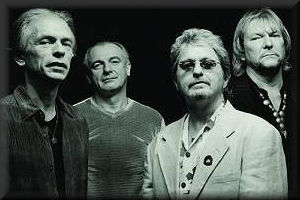 24 years, 4 months and 20 days ago Thursday, August 16, 2001 Kettering, Ohio Fraze Pavillion show #1,771
|
Chris Kee [From the Dayton Daily News: 08.10.2001] Tales From Philharmonic Concerts Yes brings orchestral fantasies to life By CAROL SIMMONS DAYTON DAILY NEWS KETTERING — The answer is: “Yes.” The question was: “Would the British progressive-rock band ever undertake a performance tour with orchestral accompaniment?” Yes founding member and bassist Chris Squire said that fans have been requesting such a venture for some time now; since March 21, 1970, by most accounts. That’s when the band gave its one and only performance with symphonic backing — until this summer — in an adventurous concert at London’s Queen Elizabeth Hall. In its 34th year as a band — and in anticipation of the September release of a new studio album — Yes finally has taken the symphonic concept on the road. What’s more surprising is that the group, which shares credit for defining the symphonic rock genre, hadn’t done so before. Founded in 1967, Yes pioneered a musical form that combined classical and even jazz influences with an arty pop-rock flavor. While known for several high-profile personnel changes, the band also was recognized for a distinctive musicianship regardless of its membership of the moment. Scoring its first U.S. hit in 1972 with Roundabout, Yes went on to produce rock classics such as I’ve Seen All Good People and Owner of a Lonely Heart, a departure toward pop in the 1980s. Albums such as Fragile, released in 1971, 1972’s Close to the Edge and the triple-live album Yessongs from ’73 defined progressive, symphonic rock. The band’s forthcoming album, titled Magnification, reportedly doesn’t diverge far afield from the group’s original vision. In Vancouver last week — eight days into a 30-city North American tour — bassist Squire said he was “just getting used to” the tour’s symphonic arrangement. On Thursday, Squire — along with fellow Yes veterans Jon Anderson (vocals), Steve Howe (guitar) and Alan White (drums) — bring the tour to Kettering’s Fraze Pavilion. The band will be joined onstage by members of the Dayton Philharmonic Orchestra. “We’re playing with a different orchestra each show,” Squire said. The band members achieve some continuity from one performance to the next by bringing along their own violinist to serve as concertmaster as well as their own conductor to lead the classically trained musicians. Serving as the tour’s main conductor is Larry Groupe, an Emmy-winning TV and film composer who arranged the music and conducted the orchestra musicians for the new album. Bill Stromberg and Jung-Ho Pak are scheduled to fill in when needed, according to the official Yes Web site, at www.yesworld.com. Playing with an orchestra has been “definitely interesting,” Squire said in a distinctly clipped British accent. “There’s a much fuller sound with 50 extra people,” he said, adding however, “Really, from where I am on the stage, I don’t get the full effect.” That full effect is meant for the audience, and particularly the fans who requested the addition. Offering the audience what Squire calls “full-value entertainment” has long been a part of the Yes concert experience. Although some observers over the years have criticized the band for a perceived pretentiousness, Yes never skimped on the production aspects of its performances, using lasers early on along with in-the-round revolving stages and elaborate fantasy art-inspired sets. “We were always interested in putting on a good show, as well as in the music,” Squire said. “We’ve always been fans of classical music,” Squire said of himself and his Yes cohorts. The band’s medium was always decidedly rock, but “we’ve always written music that lends itself to an orchestral flavor.” Still, Squire said he has “had no formal (musical) training. I didn’t really start playing an instrument until I was about 15,” he said. “I was 15 when the Beatles started, and that seemed like a real neat thing to do." Another element that set Yes apart from other rock groups is its penchant for mystical, even spiritual-themed, lyrics. "Yes has always carried a message of hope in our lyrics," Squire said. "We've never been a band that's been hard core rock 'n' roll, that's down and dirty. We've taken the moral high ground." |